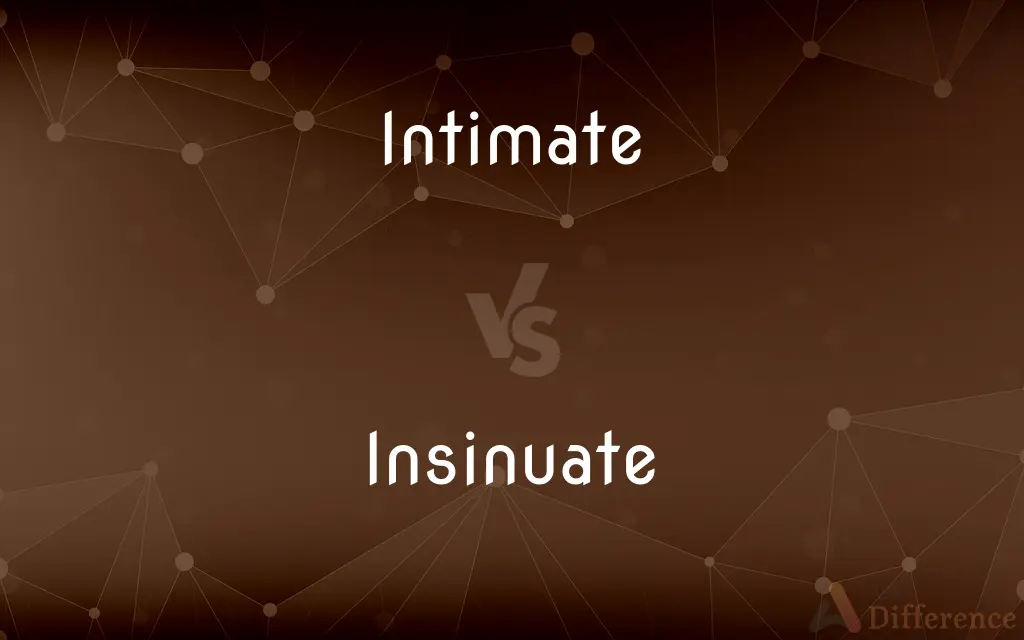Intimate vs. Insinuate — What's the Difference?
By Fiza Rafique & Maham Liaqat — Updated on April 18, 2024
Intimate involves a close and detailed knowledge or experience, whereas insinuate suggests a subtle or indirect hinting or suggestion.

Difference Between Intimate and Insinuate
Table of Contents
ADVERTISEMENT
Key Differences
Intimate refers to something closely acquainted or deeply personal, typically used in the context of relationships or knowledge. On the other hand, insinuate often involves introducing something (an idea, suggestion, or suspicion) in a subtle and indirect way, without being overtly clear.
When you intimate something, you make it known through an implicit understanding or private disclosure. Whereas, to insinuate involves maneuvering a point into someone’s mind perhaps with cunning or stealth, often implying something negative or controversial without stating it outright.
Intimate can also describe a setting or atmosphere that is cozy, comfortable, and conducive to private conversation or solitude. In contrast, insinuate does not pertain to environments but strictly to the method of communication, which can sometimes have manipulative connotations.
The verb form of intimate, as in "to intimate something," means to suggest or imply something subtly. Meanwhile, insinuate could involve embedding oneself into a situation or group using crafty and subtle tactics, beyond just verbal suggestion.
Intimacy as a noun derived from intimate denotes a close familiarity or friendship, highlighting deep emotional connections. Insinuation, the noun form of insinuate, typically carries a negative implication, referring to indirect or covert suggestions that are often unwelcome or malicious.
ADVERTISEMENT
Comparison Chart
Definition
Closely acquainted; deeply personal.
To suggest or hint something in an indirect way.
Usage in Speech
Often used to describe relationships or knowledge.
Used to imply subtlety in communication.
Connotation
Positive, denoting closeness and familiarity.
Often negative, suggesting slyness or stealth.
Derived Nouns
Intimacy (close familiarity, friendship).
Insinuation (an indirect or covert suggestion).
Example Context
Describing personal relationships or settings.
Often used when implying suspicion or criticism.
Compare with Definitions
Intimate
Close and personal.
They enjoyed an intimate friendship for many years.
Insinuate
To suggest or hint at something indirectly.
He insinuated that something was wrong without saying it outright.
Intimate
Of an atmosphere, cozy and conducive to comfort.
The restaurant had an intimate setting, perfect for a date night.
Insinuate
To maneuver oneself into a position of favor or advantage stealthily.
He insinuated himself into the conversation at the party.
Intimate
Involving detailed knowledge.
She had an intimate understanding of the legal issues.
Insinuate
Implanting an idea subtly.
The film insinuates doubts about the hero’s integrity.
Intimate
Private and confidential.
He shared intimate details of his life only with close friends.
Insinuate
To suggest something negative in a subtle way.
She insinuated that they were not telling the truth.
Intimate
To state or make known subtly.
He intimated that they might be leaving soon.
Insinuate
To slide or wiggle into a place subtly.
The cat insinuated itself into the warmest corner of the room.
Intimate
Closely acquainted; familiar
Intimate friends
They are on intimate terms
Insinuate
To express or otherwise convey (a thought, for example) in an indirect or insidious way.
Intimate
A very close friend
His circle of intimates
Insinuate
To maneuver or insert (oneself) into a place
"One of the boys insinuated himself next to me and squeezed my hand" (Caroline Preston).
Intimate
State or make known
Mr Hutchison has intimated his decision to retire
Insinuate
To cause (oneself) to be involved or accepted by subtle and artful means
Insinuated himself into court intrigues.
Insinuated herself into my good graces.
Intimate
Characterized by close personal acquaintance or familiarity
Intimate friends.
Insinuate
To make insinuations.
Intimate
Relating to or indicative of one's deepest nature
Intimate prayers.
Insinuate
To hint; to suggest tacitly (usually something bad) while avoiding a direct statement.
She insinuated that her friends had betrayed her.
Intimate
Essential; innermost
The intimate structure of matter.
Insinuate
(rare) To creep, wind, or flow into; to enter gently, slowly, or imperceptibly, as into crevices.
Intimate
Marked by informality and privacy
An intimate nightclub.
Insinuate
To ingratiate; to obtain access to or introduce something by subtle, cunning or artful means.
Intimate
Very personal; private
An intimate letter.
Insinuate
To introduce gently or slowly, as by a winding or narrow passage, or a gentle, persistent movement.
The water easily insinuates itself into, and placidly distends, the vessels of vegetables.
Intimate
A close friend or confidant.
Insinuate
To introduce artfully; to infuse gently; to instill.
All the art of rhetoric, besides order and clearness, are for nothing else but to insinuate wrong ideas, move the passions, and thereby mislead the judgment.
Horace laughs to shame all follies and insinuates virtue, rather by familiar examples than by the severity of precepts.
Intimate
To state or express indirectly
She intimated that she did not want him to call back.
Insinuate
To hint; to suggest by remote allusion; - often used derogatorily; as, did you mean to insinuate anything?
Intimate
To make evident indirectly
His worn clothes intimated that he was in need of money.
Insinuate
To push or work (one's self), as into favor; to introduce by slow, gentle, or artful means; to ingratiate; - used reflexively.
He insinuated himself into the very good grace of the Duke of Buckingham.
Intimate
(Archaic) To announce; proclaim.
Insinuate
To creep, wind, or flow in; to enter gently, slowly, or imperceptibly, as into crevices.
Intimate
Closely acquainted; familiar.
An intimate friend
He and his sister deeply valued their intimate relationship as they didn't have much else to live for.
Insinuate
To ingratiate one's self; to obtain access or favor by flattery or cunning.
He would insinuate with thee but to make thee sigh.
To insinuate, flatter, bow, and bend my limbs.
Intimate
; private.
An intimate setting
Insinuate
Introduce or insert (oneself) in a subtle manner;
He insinuated himself into the conversation of the people at the nearby table
Intimate
Pertaining to details that require great familiarity to know.
Insinuate
Give to understand;
I insinuated that I did not like his wife
Intimate
Very finely mixed.
Black powder consists of an intimate mixture of potassium nitrate, charcoal, and sulfur.
Intimate
A very close friend.
Only a couple of intimates had ever read his writing.
Intimate
(in plural intimates) women's underwear, sleepwear, or lingerie, especially offered for sale in a store.
You'll find bras and panties in the women's intimates section upstairs.
Intimate
(ambitransitive) To suggest or disclose (something) discreetly.
He intimated that we should leave before the argument escalated.
Intimate
To notify.
I will intimate you when the details are available.
Intimate
Innermost; inward; internal; deep-seated; hearty.
Intimate
Near; close; direct; thorough; complete.
He was honored with an intimate and immediate admission.
Intimate
Close in friendship or acquaintance; familiar; confidential; as, an intimate friend.
Intimate
An intimate friend or associate; a confidant.
Intimate
To announce; to declare; to publish; to communicate; to make known.
He, incontinent, did proclaim and intimate open war.
So both conspiring 'gan to intimateEach other's grief.
Intimate
To suggest obscurely or indirectly; to refer to remotely; to give slight notice of; to hint; as, he intimated his intention of resigning his office.
The names of simple ideas and substances, with the abstract ideas in the mind, intimate some real existence, from which was derived their original pattern.
Intimate
Someone to whom private matters are confided
Intimate
Give to understand;
I insinuated that I did not like his wife
Intimate
Imply as a possibility;
The evidence suggests a need for more clarification
Intimate
Marked by close aquaintance, association, or familiarity;
Intimate friend
Intimate relations between economics, politics, and legal principles
Intimate
Having or fostering a warm or friendly atmosphere; especially through smallness and informality;
Had a cozy chat
A relaxed informal manner
An intimate cocktail lounge
The small room was cozy and intimate
Intimate
Having mutual interests or affections; of established friendship;
On familiar terms
Pretending she is on an intimate footing with those she slanders
Intimate
Innermost or essential;
The inner logic of Cubism
The internal contradictions of the theory
The intimate structure of matter
Intimate
Thoroughly acquainted with through study or experience;
This girl, so intimate with nature
KnowledgeaIble about the technique of painting
Common Curiosities
Can intimate be used in formal communication?
Yes, intimate can be used in formal settings to describe deep understanding or personal relationships.
Is insinuating considered a positive communication style?
Insinuating is generally not considered positive as it can imply manipulation or indirect criticism.
How do the noun forms intimacy and insinuation differ?
Intimacy refers to closeness and affection, while insinuation refers to an indirect suggestion, often with negative connotations.
Can insinuate have legal implications?
Yes, insinuating something in certain contexts, like suggesting someone’s guilt indirectly, can have legal implications.
Are there positive contexts for using insinuate?
While often negative, insinuate can be used neutrally to describe clever or indirect ways of introducing ideas.
What does it mean to intimate something?
To intimate means to make something known in a subtle or indirect way, often privately.
How do the meanings of intimate and insinuate influence their use in literature?
In literature, intimate is used to develop deep, complex relationships, while insinuate is often used in plots involving intrigue or subtle conflicts.
What is the impact of insinuating on personal relationships?
Insinuating can damage relationships if it involves sly hints or accusations without clear communication.
How are intimate and insinuate different in communication?
Intimate involves conveying deep personal knowledge or closeness, whereas insinuate involves subtle hints, often with manipulative undertones.
Does intimate only relate to personal relationships?
No, intimate can also describe detailed knowledge or an environment conducive to privacy.
Is it common to use intimate in everyday conversation?
Yes, intimate is commonly used to refer to close relationships or settings that are cozy and personal.
What does insinuate typically imply?
Insinuate often implies a subtle, sometimes negative suggestion, hinting at something without direct evidence.
How can one effectively use intimate in professional discourse?
Intimate can be effectively used to express a thorough understanding of professional subjects, enhancing credibility.
Can insinuate be used in a positive way?
While typically negative, insinuate can be seen positively when used to tactfully introduce ideas or changes.
What are the risks of insinuating in professional settings?
Insinuating can lead to misunderstandings and mistrust, as it often conveys information indirectly and ambiguously.
Share Your Discovery

Previous Comparison
Congress vs. Parliament
Next Comparison
Bedbug vs. ChinchAuthor Spotlight
Written by
Fiza RafiqueFiza Rafique is a skilled content writer at AskDifference.com, where she meticulously refines and enhances written pieces. Drawing from her vast editorial expertise, Fiza ensures clarity, accuracy, and precision in every article. Passionate about language, she continually seeks to elevate the quality of content for readers worldwide.
Co-written by
Maham Liaqat











































